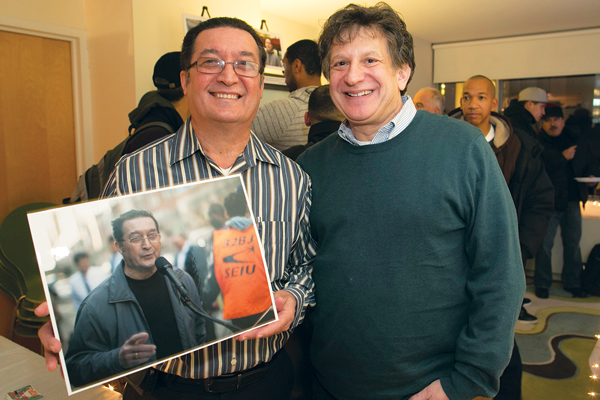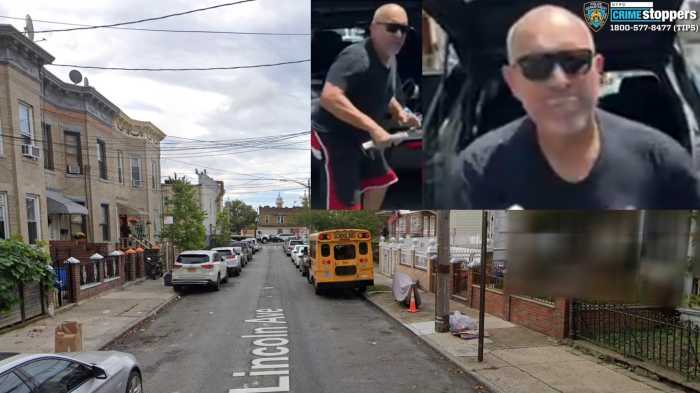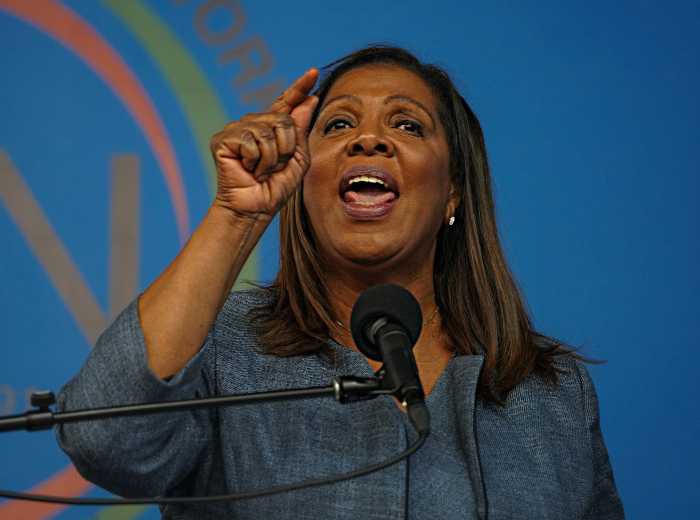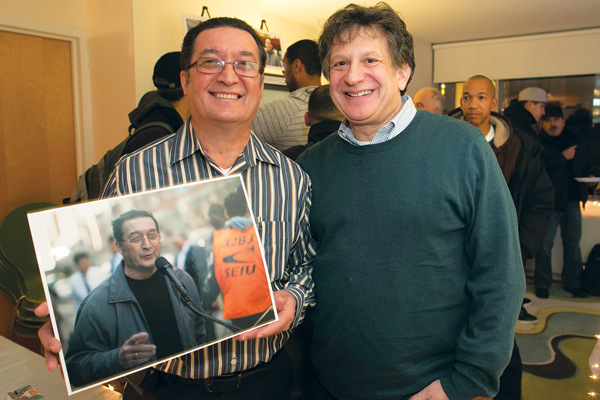
William Rosado, porter at 520 W. 23rd St., poses with his photo. At right is the exhibit’s host, Lowell Kern.
BY EILEEN STUKANE | Working for subpar wages and limited benefits in luxury buildings whose units often sell for over $1 million, a group of service workers have spent the past two years engaged in public and behind-the-scenes efforts to join the 32BJ Service Employees International Union (SEIU).
Documentation of that ongoing struggle has been preserved in a photo/video exhibit that’s open to the public, and takes place in the home of a West Chelsea resident at odds with his co-op board.
“Beneath The Rails: Working Under the High Line” shows the workers in West Chelsea’s luxury buildings in different facets of their lives — at home with their families, and in the streets fighting for a better standard of living.
The pop-up exhibit opened on Tues., Nov. 18 and closed the following night. It took place at the Marais, 520 W. 23rd St., in the apartment of Community Board 4 member Lowell Kern. “The people who work here make this building a great place to live in,” says Kern, “and since this fight started I’ve been here to support them. I’ll do anything I can to help them get the recognition and protections they deserve as members of the union.”
State Senator Brad Hoylman, State Assemblymember Richard Gottfried and City Councilmember Corey Johnson attended the exhibit’s opening to show their continued support of the workers. Gottfried and Johnson posed with photos that included their participation in earlier marches for this cause. The 32BJ President Hector Figeuroa attended with about 15 union members who were on hand to offer solidarity to their nonunion compatriots.
In many of the luxury buildings that have sprung up in proximity of the High
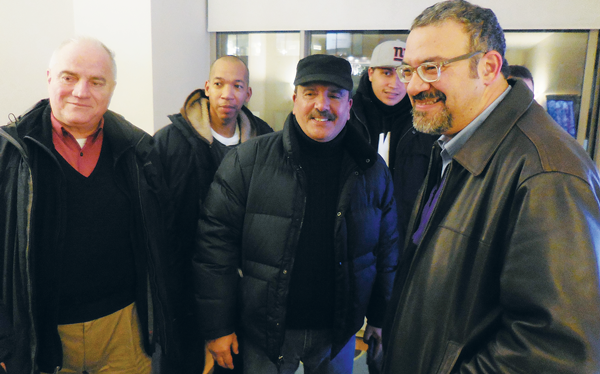
32BJ President Hector Figueroa (far right, foreground) with members of his union, at the exhibit’s opening night.
Line, non-union service workers who guard the doors and maintain the building find themselves paid considerably less than the $21 an hour set by 32BJ, sometimes as little as $13 an hour — and they are not offered the comprehensive health insurance and pension of their unionized counterparts.
It seems logical for the underpaid workers to join the union, and for the condo/co-op boards to willingly agree to the unionization that would allow a living wage and benefits to those who take care of their daily needs — but this is not occurring without a fight. According to 32BJ President Hector Figueroa, across the city eight out of 10 buildings are unionized, and for luxury buildings like the Marais, the cost would be less than $100 a unit per month, or no more than $3 a day, but still boards have refused to allow workers to become union members. The fight has been going on for more than two years, as workers are attempting to unionize in eight buildings in West Chelsea.
William Rosado, 61, has been a porter/maintenance worker at the Marais for over seven years. Although he now earns $20 an hour, he does not have a pension. The health insurance through his job has high deductibles and a limited choice of doctors. “It’s also hard to get brand name drugs that I need,” he says. “It would be so much better to have the union health insurance, which would let me include family, my wife.”
RESIDENTS APPROVE, BOARD DENIES
The majority of residents at 520 W. 23rd St. — 80 out of 107 — signed the petition to allow their service workers to join the union. When the maintenance was raised 15 percent this year, a number of those residents congratulated Rosado on joining the union because they assumed the increase was to cover increased costs for service workers. “I told them that the board had rejected our petition,” he said, “and they were not aware.”
The Marais five-member board has not shown a willingness to negotiate with the workers and the union, as it has not responded to communications from union representatives. Word that the board did their own survey of residents is unconfirmed. From that survey, which if it exists has not been shared, the board has decided to refuse unionization. No official reason has been given to the union for the board’s refusal to speak with their representatives.
32BJ President Figueroa also explains that what a board may not fully appreciate is that in a union, “Workers get training benefits that allow them to learn and keep up to date on skills, such as how to interact with the public, what to do in case of fire or any other emergencies or threats, and also they’re trained in servicing air conditioning, plumbing, electricity, in how to handle computerized systems. In the union, their workers will be offering better value and be more productive.”
MORE VOICES OF SOLIDARITY
On hand to moderate the exhibit’s opening was Tony Moran, a union member who has been a doorman at London Terrace for the last decade. He spoke to the gathering about the enjoyable relationships service workers have with store owners, mail people, restaurants and delivery services, relationships that “keep the community moving.”
As a union member, Moran says he has been able to “provide my family with quality healthcare, put my two kids through college, and pursue my academic endeavors. Knowing that my brothers and sisters who perform the same line of work are not doing the same as I am pains me.” He added, “This exhibit shows a group of workers who only want what’s right for their families. Resilience, support, solidarity, commitment and love have been captured.”
Elected officials responded in kind. Councilmember Corey Johnson noted that with the development that has occurred around the High Line, “The composition of our neighborhood has changed tremendously, but one thing is certain: everyone must be valued for the work they do and who they are in our neighborhood. If you put in 40 hours a week, there should be a basic premise and promise that is met. You should be able to make a living wage, support your family, have free or affordable health insurance, a pension, be able to retire with dignity and you should not have to worry about making ends meet.”
Assemblymember Richard Gottfried said that his West Side residence has been a 32BJ building for decades and “I know that it is a better place to work and a better place to live because the union contract assures the workers in our building that they are treated with respect and fairness.”
State Senator Brad Hoylman spoke about the “stark inequality” that exists as a result of “the luxury buildings cropping up along the High Line and the struggling service workers who are employed by these buildings. We need as a city, as public officials, and as a community to make sure that those people who live at the very top of the income stratosphere are helping to provide for those at the very bottom.”
Figueroa expressed to this newspaper that Chelsea is a welcoming community that defines what New York City is all about. He added, “We also would like Chelsea to be a place where good jobs are preserved and sustained, and where people who work hard to make the residents of Chelsea safe and secure could have a chance to do the same for their families.”



